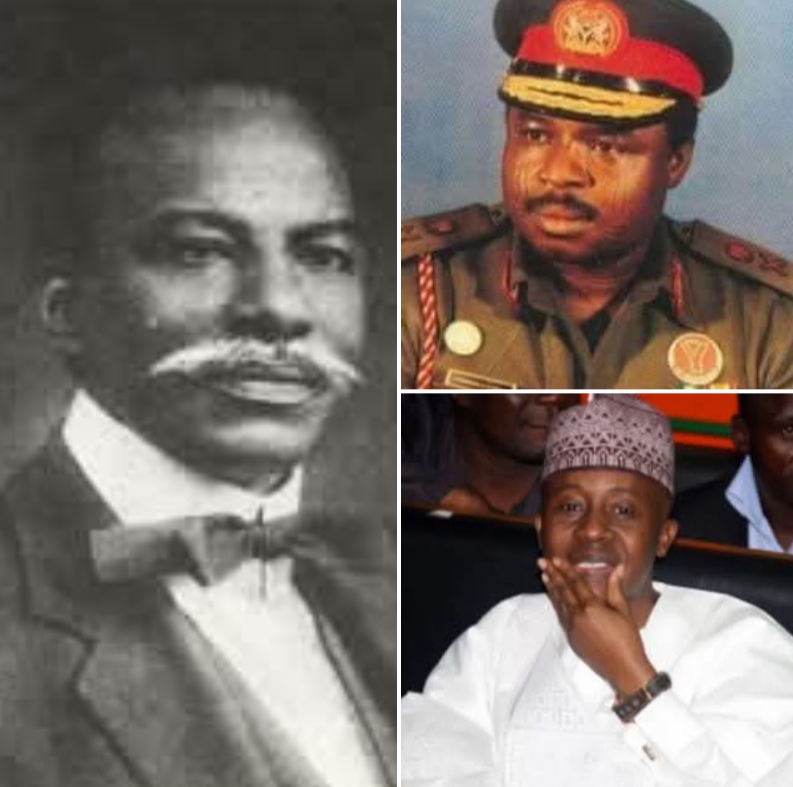Headline
BREAKING: Tinubu grants clemency to Lawan, Vatsa, Macaulay, pardons man jailed for cocaine, others

President Bola Tinubu has approved the pardon of late Herbert Macaulay, late Major General Mamman Vatsa, and Kano politician Farouk Lawan.
A statement released on Thursday by presidential spokesman Bayo Onanuga confirmed that Tinubu also extended clemency to 82 inmates across the country.
PlatinumPost reports that Vatsa, who was executed in 1986 after being convicted of treason, received a posthumous pardon from the president.
Vatsa was among 17 individuals granted presidential clemency following the endorsement of the National Council of State, which convened in Abuja on Thursday.
The statement read: “President Tinubu also granted a posthumous pardon to Herbert Macaulay, a Nigerian nationalist and co-founder, along with Dr Nnamdi Azikiwe, of the National Council of Nigeria and the Cameroons (NCNC). Macaulay was the party’s first president, which played a pivotal role in Nigeria’s struggle for independence. However, in 1913, Macaulay was believed unjustly convicted by the British colonialists and banned from public office. Macaulay died in 1946, but the stigma of being an ex-convict was not exorcised from his records until now.
“President Tinubu also pardoned four former convicts, including former House of Representatives member, Farouk Lawan, Mrs Anastasia Daniel Nwaobia, Barrister Hussaini Umar and Ayinla Saadu Alanamu. They were pardoned to enable them to integrate into society, having demonstrated sufficient remorse. Nweke Francis Chibueze, serving a life sentence for cocaine, was pardoned, along with Dr Nwogu Peters, who had served 12 out of his 17-year sentence for fraud.
“The Ogoni Nine: Ken Saro Wiwa, Saturday Dobee, Nordu Eawo, Daniel Gbooko, Paul Levera, Felix Nuate, Baribor Bera, Barinem Kiobel and John Kpuine were formally pardoned. At the same time, the President awarded national honours to the Ogoni Four—Chief Albert Badey, Chief Edward Kobani, Chief Samuel Orage, and Theophilus Orage.”
The statement added that, in exercising his constitutional prerogative of mercy, President Tinubu granted clemency to 82 inmates and reduced the prison terms of 65 others.
“He gave a reprieve for seven inmates on the death row by commuting their sentences to life imprisonment.
“President Tinubu acted on the recommendations of the Presidential Advisory Committee on the Prerogative of Mercy (PACPM). The committee has 12 members, with the Attorney General and Justice Minister, Prince Lateef Fagbemi, as chairman. The other members are Chief Akinlolu Olujinmi, CON; Prof. Alkasum Abba; Prof. (Mrs.) Nike Y. Sidikat Ijaiya; Justice Augustine B. Utsaha; and the Secretary, Dr Onwusoro Maduka, a former Permanent Secretary.
“The institutional representatives on the Committee are: the Permanent Secretary, Special Duties and Inter-Governmental Affairs; representatives of the Nigeria Police Force, Nigerian Correctional Service, National Human Rights Commission, Nigerian Supreme Council for Islamic Affairs (NSCIA), and Christian Association of Nigeria (CAN).
“The committee’s final report was presented to the Council of State on Thursday in Abuja, as required by the constitution.”
According to the statement, the report noted, “A total of 175 inmates were interviewed, and 62 applications were received on behalf of 119 inmates considered by the committee, making it a total of 294.
“One hundred and sixty of the inmates interviewed were male, while 15 were female. Eighty-two inmates were recommended for clemency; two (2) for pardon; sixty-five (65) inmates for reduction of their terms of imprisonment, and seven (7) inmates on death row for commutation to life imprisonment.
“Also, fifteen (15) ex-convicts were recommended for Presidential Pardon, eleven (11) of them are deceased (including Ogoni 9). The Ogoni four (4) were also recommended for the Post-Humous National Honours Award.
“On the whole, a total of one hundred and seventy-five (175) beneficiaries are recommended.’’
The statement further said the committee based its recommendations on criteria such as old age (60 years and above), terminal illness, youth (16 years and below), long-term imprisonment with good conduct (10 years or more), and completion of at least three years in custody.
It added that “those who have been in Custodial centres, learnt sustainable vocational trades capable of keeping them away from crime; those who are adjudged remorseful; those who Correctional Officers recommended for exemplary behaviour and Nigerian prisoners deported from other countries.”





















